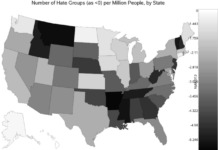
We already knew that Justice Clarence Thomas was an embarrassment. But he proved it in a big way on Monday. After keeping his mouth closed when the Supreme Court was in session for more than a decade, Thomas broke his silence when he wondered–presumably with a straight face–if people convicted of domestic violence should be allowed to own guns. In so doing, he once again embarrassed himself, the seat he holds, and the Supreme Court.
Before Monday, the last time Thomas had asked a question had been on February 22, 2006. Since then, the only time he had spoken up at all during oral argument was in 2013, when he joked that a law degree from Harvard was reason to question whether a lawyer was any good; Thomas is a Yalie.
However, he apparently felt compelled to open his mouth during oral argument on Voisine v. United States. Stephen Voisine, a Maine resident, was convicted of hitting his girlfriend during a domestic dispute. Under federal law, anyone who “intentionally, knowingly, or recklessly” causes bodily harm during a domestic dispute is indefinitely suspended from buying, owning, or possessing a gun. Voisine appealed, contending that recklessly causing bodily harm shouldn’t disqualify someone from owning a gun.
The Supremes opted to take the case–but only to decide the very narrow technical question of reckless conduct. As Illana Eisenstein, the assistant to the solicitor general who was arguing the case for the government, was getting ready to sit down, Thomas asked Eisenstein if she knew of any other examples “where a misdemeanor violation suspends a constitutional right.” He seemed to be befuddled that a person could be stripped of the right to own a gun “even if that violence is unrelated to the use–the possession of a gun” and even when that person has yet to actually “use a weapon against a family member.”
As if Thomas hadn’t already made himself look like enough of a fool, he kept digging. When Eisenstein pointed out that the federal law in question was based on research showing that those convicted of domestic violence have “up to a sixfold greater risk” of killing a relative with a gun in the future, Thomas harrumphed that it would be no different from barring a newspaper publisher from ever publishing again if he published “indecent displays” of children.
Eisenstein noted that it would be possible to limit the “manner and means” in which a publisher could do business. This law, she added, was no different, since it limits the manner and means by which a potential domestic abuser could do harm again. She then argued that Voisine had multiple convictions for domestic violence, and was in “close proximity” of a gun–the very situation for which this law was written. She reminded Thomas that this law has a “compelling purpose”–the prevention of gun violence and the prevention of domestic violence.
This law is a simple, common-sense measure to prevent domestic violence–and Thomas responded with arguments that could have easily been written by Wayne LaPierre or Ted Nugent. Did it occur to Thomas that maybe, just maybe, someone who has a history of violence shouldn’t be within an area code of a gun? Apparently not. Thomas had a chance to take a strong stand against domestic violence–and blew it eight ways to Sunday.
As a black man who has often hung his head in shame at how Thurgood Marshall’s old seat has been disgraced over the last quarter-century, I’ve learned to expect very little from Thomas. This is, after all, a guy who said–with a straight face–that slaves never lost their dignity. I repeat what I said last summer–anyone who even thinks slavery doesn’t strip you of dignity is not fit to be a judge. Well, anyone who thinks people convicted of domestic violence should be allowed to carry a gun is unfit to be a judge. Both together? After this, the next time Thomas opens his mouth ought to be when he resigns.




